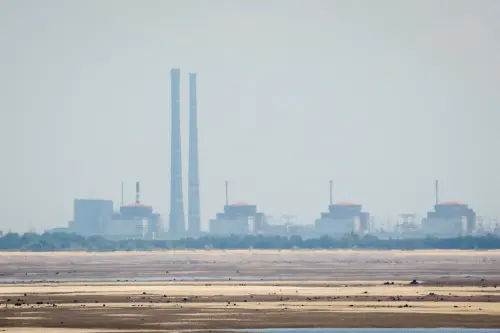Donald Trump's proposal regarding Ukraine's largest nuclear power station carries a significant caveat: it would take years before any return on investment could be anticipated.
The vast plant, which has been occupied by Russia since the conflict's early days, faces numerous challenges. Its six reactors are currently in cold shutdown, and it has lost its primary cooling water supply, leaving the condition of its equipment uncertain.
During a recent conversation, Trump suggested to President Zelenskiy that the U.S. could assist in operating, and potentially owning, Ukraine's nuclear power facilities, as conveyed by the U.S. presidential administration. Zelenskiy later confirmed that their discussion focused specifically on the Zaporizhzhia plant. He mentioned, "The president asked me if there was an understanding that America could restore it, and I told him yes, if we could modernize it and invest money."
Two Ukrainian industry sources indicated that the proposal might serve as a way for the U.S. to explore different solutions as Trump seeks to negotiate a lasting peace that would swiftly conclude the war with Russia. One source noted that the suggestion could also exert pressure on Russia by proposing a scenario where they would need to relinquish the plant, stating that the use of the term "ownership" is provocative.
Zelenskiy projected that restoring the plant, the largest facility of its kind in Europe, could take two and a half years.
A former senior Ukrainian official remarked, "Anything is possible with the Americans, but this is something quite unusual. The Americans would own it—on what grounds? It belongs to Ukraine. If we handed it over to the USA, what would the basis be? Would they purchase it? Would they take it as a concession? Numerous questions arise."
Oleksandr Kharchenko, an energy analyst based in Kyiv, emphasized that restoring the plant to the Ukrainian grid—as Kyiv demands—would be a "game changer" for energy generation, benefiting both Ukraine and the wider eastern and central Europe regions. The station had accounted for 20% of Ukraine’s power output before the war. Ukraine had begun substantial electricity exports to the European Union shortly before the invasion but halted these when Russia attacked its infrastructure.
Despite efforts, Russian forces have not managed to connect the facility to their grid, and it currently produces no energy. Kharchenko projected that it could take up to a year to restart a single reactor, with a full restart of the station potentially taking four years due to various issues.
One significant challenge is the plant's loss of access to water from the now-depleted Kakhovka reservoir, following the destruction of the hydroelectric station and dam in 2023. The nuclear facility has been relying on water from a cooling pond, but the water level there has been steadily declining. Engineers in Ukraine's energy ministry believe that this water shortage means only two of the six reactors may be able to resume electricity generation. Furthermore, they estimate at least a year would be needed to restart even these limited operations due to uncertainty about the plant's technical condition.
A staff member at the plant, who escaped life under occupation and is now in Kyiv, reported that Ukraine has developed a comprehensive action plan for the facility's potential return. This individual, who requested anonymity to protect their family still living under occupation, noted that simply transferring the plant back to Ukraine would not suffice. The adjacent Russian-held thermal power plant, local settlements, including the city of Enerhodar, and a secure route to the Ukrainian-controlled city of Zaporizhzhia would also be essential.
Nevertheless, for residents like pensioner Olha Shyshkyna in the nearby Ukrainian-held city of Zaporizhzhia, the possibility of the plant's return remains hopeful, as it has not served any real purpose for Russia thus far. "For Russia, our nuclear station is like a suitcase without a handle. After all, it is not operational, and now it's just a plaything. To us, it’s critically important," she shared.
